Jimi Hendrix (1942-1970)
Jimi Hendrix (1942-1970) was an American rock guitarist, singer, and songwriter. Although his mainstream career spanned only four years, he is widely regarded as one of the most influential electric guitarists in the history of popular music, and one of the most celebrated musicians of the 20th century. The Rock and Roll Hall of Fame describes him as “arguably the greatest instrumentalist in the history of rock music”.
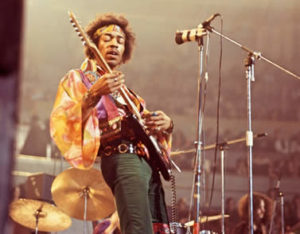 Born in Seattle, Washington, Hendrix began playing guitar at the age of 15. In 1961, he enlisted in the U.S. Army and trained as a paratrooper in the 101st Airborne Division; he was granted an honorable discharge the following year. Soon afterward, he moved to Clarksville, Tennessee, and began playing gigs on the Chitlin’ Circuit, earning a place in the Isley Brothers’ backing band and later with Little Richard, with whom he continued to work through mid-1965. He then played with Curtis Knight and the Squires before moving to England in late 1966 after being discovered by Linda Keith, who in turn interested bassist Chas Chandler of the Animals in becoming his first manager. Within months, Hendrix had earned three UK top ten hits with the Jimi Hendrix Experience: “Hey Joe”, “Purple Haze”, and “The Wind Cries Mary”. He achieved fame in the U.S. after his performance at the Monterey Pop Festival in 1967, and in 1968 his third and final studio album, Electric Ladyland, reached number one in the U.S.; it was Hendrix’s most commercially successful release and his first and only number one album. The world’s highest-paid performer, he headlined the Woodstock Festival in 1969 and the Isle of Wight Festival in 1970 before his accidental death from barbiturate-related asphyxia on September 18, 1970, at the age of 27.
Born in Seattle, Washington, Hendrix began playing guitar at the age of 15. In 1961, he enlisted in the U.S. Army and trained as a paratrooper in the 101st Airborne Division; he was granted an honorable discharge the following year. Soon afterward, he moved to Clarksville, Tennessee, and began playing gigs on the Chitlin’ Circuit, earning a place in the Isley Brothers’ backing band and later with Little Richard, with whom he continued to work through mid-1965. He then played with Curtis Knight and the Squires before moving to England in late 1966 after being discovered by Linda Keith, who in turn interested bassist Chas Chandler of the Animals in becoming his first manager. Within months, Hendrix had earned three UK top ten hits with the Jimi Hendrix Experience: “Hey Joe”, “Purple Haze”, and “The Wind Cries Mary”. He achieved fame in the U.S. after his performance at the Monterey Pop Festival in 1967, and in 1968 his third and final studio album, Electric Ladyland, reached number one in the U.S.; it was Hendrix’s most commercially successful release and his first and only number one album. The world’s highest-paid performer, he headlined the Woodstock Festival in 1969 and the Isle of Wight Festival in 1970 before his accidental death from barbiturate-related asphyxia on September 18, 1970, at the age of 27.
Hendrix was inspired musically by American rock and roll and electric blues. He favored overdriven amplifiers with high volume and gain, and was instrumental in utilizing the previously undesirable sounds caused by guitar amplifier feedback. He helped to popularize the use of a wah-wah pedal in mainstream rock, and was the first artist to use stereophonic phasing effects in music recordings. Holly George-Warren of Rolling Stone commented: “Hendrix pioneered the use of the instrument as an electronic sound source. Players before him had experimented with feedback and distortion, but Hendrix turned those effects and others into a controlled, fluid vocabulary every bit as personal as the blues with which he began.”
Keith Richards (1943- )
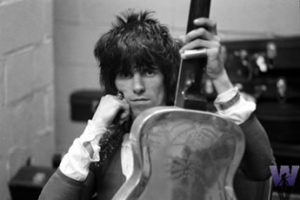 Keith Richards is an English guitarist, singer, songwriter, best-selling memoirist and founding member of the rock band The Rolling Stones. Rolling Stone Magazine credited Richards for “rock’s greatest single body of riffs” on guitar and ranked him 4th on its list of 100 best guitarists.
Keith Richards is an English guitarist, singer, songwriter, best-selling memoirist and founding member of the rock band The Rolling Stones. Rolling Stone Magazine credited Richards for “rock’s greatest single body of riffs” on guitar and ranked him 4th on its list of 100 best guitarists.
Fourteen songs that Richards wrote with the Rolling Stones’ lead vocalist Mick Jagger are listed among Rolling Stone magazine’s “500 Greatest Songs of All Time”. The Stones are generally known for their guitar interplay of rhythm and lead (“weaving”) between Richards and Brian Jones, Mick Taylor and Ronnie Wood over the years. In spite of this, Richards plays the only guitar tracks on some of their most famous songs including “Paint It Black”, “Ruby Tuesday”, “Sympathy for the Devil”, “Gimme Shelter”, and “Angie.”
Pete Townshend (1945-)
Pete Townshend is an English musician, singer, songwriter, and multi-instrumentalist, best known as the lead guitarist, backing vocalist, and main songwriter, for the rock band The Who. His career with the Who spans over 50 years, during which time the band grew to be considered one of the most influential bands of the 20th century.
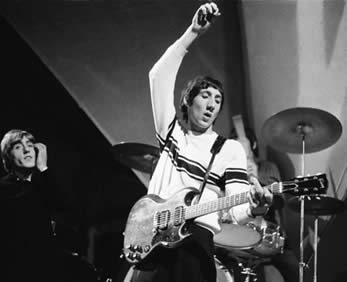 Townshend is the main songwriter for The Who, having written well over 100 songs for the band’s 11 studio albums, including concept albums and the rock operas Tommy and Quadrophenia, plus popular rock radio staples such as Who’s Next, and dozens more that appeared as non-album singles, bonus tracks on reissues, and tracks on rarities compilations such as Odds & Sods (1974). He has also written more than 100 songs that have appeared on his solo albums, as well as radio jingles and television theme songs. Although known primarily as a guitarist, he also plays keyboards, banjo, accordion, harmonica, ukulele, mandolin, violin, synthesizer, bass guitar, and drums, on his own solo albums, several Who albums and as a guest contributor to an array of other artists’ recordings. He is self-taught on all of the instruments he plays and has never had any formal training.
Townshend is the main songwriter for The Who, having written well over 100 songs for the band’s 11 studio albums, including concept albums and the rock operas Tommy and Quadrophenia, plus popular rock radio staples such as Who’s Next, and dozens more that appeared as non-album singles, bonus tracks on reissues, and tracks on rarities compilations such as Odds & Sods (1974). He has also written more than 100 songs that have appeared on his solo albums, as well as radio jingles and television theme songs. Although known primarily as a guitarist, he also plays keyboards, banjo, accordion, harmonica, ukulele, mandolin, violin, synthesizer, bass guitar, and drums, on his own solo albums, several Who albums and as a guest contributor to an array of other artists’ recordings. He is self-taught on all of the instruments he plays and has never had any formal training.
Townshend has also contributed to and authored many newspaper and magazine articles, book reviews, essays, books, and scripts, and he has collaborated as a lyricist and composer for many other musical acts. Due to his aggressive playing style and innovative songwriting techniques, Townshend’s works with The Who and in other projects have earned him critical acclaim. He was ranked No. 3 in Dave Marsh’s list of Best Guitarists in The New Book of Rock Lists, No. 10 in Gibson.com’s list of the top 50 guitarists, and No. 10 again in Rolling Stone magazine’s updated 2011 list of the 100 greatest guitarists of all time. In 1983, Townshend received the Brit Award for Lifetime Achievement, in 1990 was inducted into the Rock and Roll Hall of Fame as a member of the Who, in 2001 received a Grammy Lifetime Achievement Award as a member of the Who, and in 2008 received Kennedy Center Honors. He and Daltrey received The George and Ira Gershwin Award for Lifetime Musical Achievement at UCLA on 21 May 2016.
George Harrison (1943-2001)
George Harrison (1943-2001) was an English guitarist, singer, songwriter, and music and film producer who achieved international fame as the lead guitarist of the Beatles. Often referred to as “the quiet Beatle”, Harrison embraced Hindu mythology and helped broaden the horizons of his fellow Beatles as well as their Western audience by incorporating Indian instrumentation in their music. Although most of the Beatles’ songs were written by John Lennon and Paul McCartney, most Beatles albums from 1965 onwards contained at least two Harrison compositions. His songs for the group included “Taxman”, “Within You Without You”, “While My Guitar Gently Weeps”, “Here Comes the Sun” and “Something”, the last of which became the Beatles’ second-most covered song.
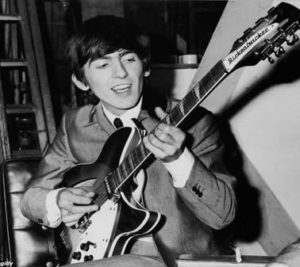 Harrison’s earliest musical influences included George Formby and Django Reinhardt; Carl Perkins, Chet Atkins and Chuck Berry were subsequent influences. By 1965 he had begun to lead the Beatles into folk rock through his interest in the Byrds and Bob Dylan, and towards Indian classical music through his use of the sitar on “Norwegian Wood (This Bird Has Flown)”. Having initiated the band’s embracing of Transcendental Meditation in 1967, he subsequently developed an association with the Hare Krishna movement. After the band’s break-up in 1970, Harrison released the triple album All Things Must Pass, a critically acclaimed work that produced his most successful hit single, “My Sweet Lord”, and introduced his signature sound as a solo artist, the slide guitar. He also organized the 1971 Concert for Bangladesh with Indian musician Ravi Shankar, a precursor for later benefit concerts such as Live Aid. In his role as a music and film producer, Harrison produced acts signed to the Beatles’ Apple record label before founding Dark Horse Records in 1974 and co-founding HandMade Films in 1978.
Harrison’s earliest musical influences included George Formby and Django Reinhardt; Carl Perkins, Chet Atkins and Chuck Berry were subsequent influences. By 1965 he had begun to lead the Beatles into folk rock through his interest in the Byrds and Bob Dylan, and towards Indian classical music through his use of the sitar on “Norwegian Wood (This Bird Has Flown)”. Having initiated the band’s embracing of Transcendental Meditation in 1967, he subsequently developed an association with the Hare Krishna movement. After the band’s break-up in 1970, Harrison released the triple album All Things Must Pass, a critically acclaimed work that produced his most successful hit single, “My Sweet Lord”, and introduced his signature sound as a solo artist, the slide guitar. He also organized the 1971 Concert for Bangladesh with Indian musician Ravi Shankar, a precursor for later benefit concerts such as Live Aid. In his role as a music and film producer, Harrison produced acts signed to the Beatles’ Apple record label before founding Dark Horse Records in 1974 and co-founding HandMade Films in 1978.
Harrison released several best-selling singles and albums as a solo performer, and in 1988 co-founded the platinum-selling supergroup the Traveling Wilburys. A prolific recording artist, he was featured as a guest guitarist on tracks by Badfinger, Ronnie Wood and Billy Preston, and collaborated on songs and music with Dylan, Eric Clapton, Ringo Starr and Tom Petty, among others. Rolling Stone magazine ranked him number 11 in their list of the “100 Greatest Guitarists of All Time”. He is a two-time Rock and Roll Hall of Fame inductee – as a member of the Beatles in 1988, and (posthumously) for his solo career in 2004
Harrison’s first marriage, to model Pattie Boyd in 1966, ended in divorce in 1977. The following year he married Olivia Harrison (née Arias), with whom he had one son, Dhani. Harrison died in 2001, aged 58, from lung cancer. He was cremated and his ashes were scattered in the Ganges and Yamuna rivers in India, in a private ceremony according to Hindu tradition. He left an estate of almost £100 million.
BB King (1925-2015)
BB King (1925-2015) was an American blues singer, electric guitarist, songwriter, and record producer. King introduced a sophisticated style of soloing based on fluid string bending and shimmering vibrato that influenced many later electric blues guitarists.
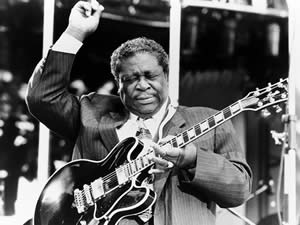 King was inducted into the Rock and Roll Hall of Fame in 1987, and is considered one of the most influential blues musicians of all time, earning the nickname “The King of the Blues”, and one of the “Three Kings of the Blues Guitar” along with Albert King and Freddie King. King was known for performing tirelessly throughout his musical career, appearing at more than 200 concerts per year on average into his 70s. In 1956, he reportedly appeared at 342 shows.
King was inducted into the Rock and Roll Hall of Fame in 1987, and is considered one of the most influential blues musicians of all time, earning the nickname “The King of the Blues”, and one of the “Three Kings of the Blues Guitar” along with Albert King and Freddie King. King was known for performing tirelessly throughout his musical career, appearing at more than 200 concerts per year on average into his 70s. In 1956, he reportedly appeared at 342 shows.
King was born on a cotton plantation in Berclair, Mississippi, and later worked at a cotton gin in Indianola, Mississippi. He was attracted to music and the guitar in church, and began his performance career in juke joints and local radio. He later lived in Memphis, Tennessee, and Chicago, and toured the world extensively. King died at the age of 89 in Las Vegas, Nevada, on May 14, 2015, from congestive heart failure and diabetic complications.
Stevie Ray Vaughan (1954-1990)
Stevie Ray Vaughan (1954-1990) was an American musician, singer, songwriter, and record producer. In spite of a short-lived mainstream career spanning seven years, he is widely considered one of the most influential electric guitarists in the history of music, and one of the most important figures in the revival of blues in the 1980s. AllMusic describes him as “a rocking powerhouse of a guitarist who gave blues a burst of momentum in the ’80s, with influence still felt long after his tragic death.”
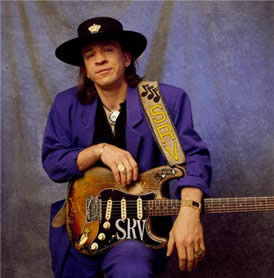 Born and raised in Dallas, Texas, Vaughan began playing guitar at the age of seven, inspired by his older brother Jimmie. In 1971 he dropped out of high school, and moved to Austin the following year. He played gigs with numerous bands, earning a spot in Marc Benno’s band, the Nightcrawlers, and later with Denny Freeman in the Cobras, with whom he continued to work through late 1977. He then formed his own group, Triple Threat Revue, before renaming the band Double Trouble after hiring drummer Chris Layton and bassist Tommy Shannon. He gained fame after his performance at the Montreux Jazz Festival in 1982, and in 1983 his debut studio album, Texas Flood, charted at number 38. The ten-song album was a commercially successful release that sold over half a million copies. After achieving sobriety in late 1986, he headlined concert tours with Jeff Beck in 1989 and Joe Cocker in 1990 before his death in a helicopter crash on August 27, 1990, at the age of 35.
Born and raised in Dallas, Texas, Vaughan began playing guitar at the age of seven, inspired by his older brother Jimmie. In 1971 he dropped out of high school, and moved to Austin the following year. He played gigs with numerous bands, earning a spot in Marc Benno’s band, the Nightcrawlers, and later with Denny Freeman in the Cobras, with whom he continued to work through late 1977. He then formed his own group, Triple Threat Revue, before renaming the band Double Trouble after hiring drummer Chris Layton and bassist Tommy Shannon. He gained fame after his performance at the Montreux Jazz Festival in 1982, and in 1983 his debut studio album, Texas Flood, charted at number 38. The ten-song album was a commercially successful release that sold over half a million copies. After achieving sobriety in late 1986, he headlined concert tours with Jeff Beck in 1989 and Joe Cocker in 1990 before his death in a helicopter crash on August 27, 1990, at the age of 35.
Vaughan was inspired musically by American and British blues rock. He favored clean amplifiers with high volume and contributed to the popularity of vintage musical equipment. He often combined several different amplifiers together and used minimal effects pedals. Chris Gill of Guitar World commented: “Stevie Ray Vaughan’s guitar tone was as dry as a San Antonio summer and as sparkling clean as a Dallas debutante, the product of the natural sound of amps with ample clean headroom. However, Vaughan occasionally used pedals to augment his sound, mainly to boost the signal, although he occasionally employed a rotating speaker cabinet and wah pedals for added textural flair.”
Vaughan received several music awards during his lifetime and posthumously. In 1983, readers of Guitar Player voted him Best New Talent and Best Electric Blues Guitar Player. In 1984, the Blues Foundation named him Entertainer of the Year and Blues Instrumentalist of the Year, and in 1987, Performance Magazine honored him with Rhythm and Blues Act of the Year. Earning six Grammy Awards and ten Austin Music Awards, he was inducted into the Blues Hall of Fame in 2000, and the Musicians Hall of Fame in 2014. Rolling Stone ranked Vaughan as the twelfth greatest guitarist of all time.[4] In 2015, he was inducted into the Rock and Roll Hall of Fame
Jimmy Page (1944- )
Jimmy Page (1944- ) is an English musician, songwriter, and record producer who achieved international success as the guitarist and founder of the rock band Led Zeppelin.
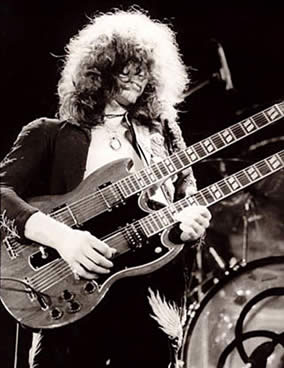 Page began his career as a studio session musician in London and, by the mid-1960s, alongside Big Jim Sullivan, was one of the most sought-after session guitarists in Britain. He was a member of the Yardbirds from 1966 to 1968. In late 1968, he founded Led Zeppelin.
Page began his career as a studio session musician in London and, by the mid-1960s, alongside Big Jim Sullivan, was one of the most sought-after session guitarists in Britain. He was a member of the Yardbirds from 1966 to 1968. In late 1968, he founded Led Zeppelin.
Page is widely considered to be one of the greatest and most influential guitarists of all time. Rolling Stone magazine has described Page as “the pontiff of power riffing” and ranked him number 3 in their list of the “100 Greatest Guitarists of All Time”. In 2010, he was ranked number two in Gibson’s list of “Top 50 Guitarists of All Time” and, in 2007, number four on Classic Rock’s “100 Wildest Guitar Heroes”. He was inducted into the Rock and Roll Hall of Fame twice; once as a member of the Yardbirds (1992) and once as a member of Led Zeppelin (1995). Page has been described by Uncut as “rock’s greatest and most mysterious guitar hero”. Los Angeles Times magazine voted Jimmy Page the 2nd greatest guitarist of all time.
